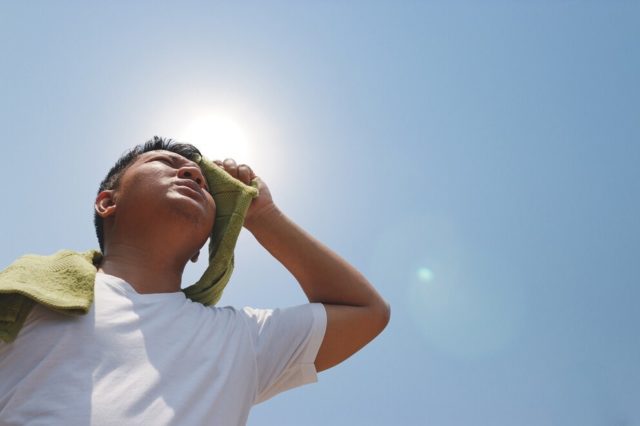
Sticky. Muggy. Oppressive. They’re words you hear often during heat waves. And with temperatures hanging out in the 80s and 90s most of this summer in central Pennsylvania, odds are, you’ll hear those words a lot more in the next two months.
While heat affects everyone’s health a little differently, the combination of heat and high humidity makes many of us susceptible to dehydration, the root cause behind most heat-related illnesses.
“Infants and the elderly are at higher risk for heat-related illnesses because they don’t regulate their core temperature well,” said Dr. Eleanor Dunham, emergency medicine physician at Penn State Health Milton S. Hershey Medical Center.
So too are people with chronic health conditions such as diabetes, hypertension, congestive heart failure or depression, due to their overall health status and the medications they take regularly. “For example, people with heart failure or hypertension often take diuretics, which already remove some water and salt from your body and therefore make you more prone to dehydration,” Dunham said.
While heat-related illnesses can sneak up on us, they often come with telltale signs. Heat cramps typically are the first sign of trouble. They’re muscle spasms that most often occur in your stomach, hands, arms, legs or back.
People experiencing heat cramps should sit down, drink fluids and move to a cool, air-conditioned place indoors if possible. Using cold compresses or taking a cold shower may also bring relief.
When cramps combine with nausea, dizziness, fainting, vomiting or headaches, heat cramps likely have turned into heat exhaustion. The three best things to do: get inside, sip water and get some rest. Consider cold compresses or a cool shower once symptoms subside.
“If you recognize heat exhaustion early enough, you can cool yourself down and prevent a trip to the emergency room,” Dunham said. “But if your symptoms don’t go away for an hour or start getting worse, you may need an intravenous drip to help your body replenish its fluid and electrolyte levels.”
The most serious heat-related illness — heat stroke — can be fatal. About 700 heat-related deaths occur in the U.S. each year, according to the Centers for Disease Control and Prevention. Symptoms include confusion, hot and dry skin, an inability to sweat and a body temperature of 103 degrees Fahrenheit or higher.
“People suffering these symptoms need medical attention immediately,” Dunham said. “Call 911.” Move the person to a cooler place. But if that person is confused, don’t ask him or her to drink water. He or she may not be able to swallow it properly. Paramedics will administer intravenous fluids as soon as they reach a person suffering heat stroke.
The best way to prevent heat-related illnesses is to stay indoors on the hottest days of the year. Some other tips:
- Drink water or low-sugar sports drinks. Avoid alcohol, caffeine or sugary drinks, which can dehydrate.
- Wear loose, cool clothing outside
- Consider using a cool mist spray when outdoors.
- Stay out of the sun during the hottest time of day (usually between 10 a.m. to 2 p.m.)
- Move your regular workout indoors at home, at an air-conditioned gym, or walk at a local mall
If you know you’ll be outside for a while, consider freezing plastic water bottles and taking them with you. “Place them against your pressure points — behind your neck, on your forehead and cheeks — one at a time to cool down,” Dunham said.
And one other tip that keeps you safe at any time of year: don’t go it alone. “Whenever you walk or do outdoor activity, take a friend with you who can help you if you run into trouble,” Dunham said.
Original source: https://news.psu.edu/story/664350/2021/07/21/medical-minute-extreme-heat-take-these-steps-stay-cool-and-avoid-er?utm_source=newswire&utm_medium=email&utm_term=664400_HTML&utm_content=07-22-2021-07-09&utm_campaign=hershey%20newswire